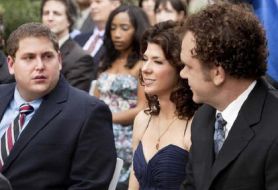|
Newest Reviews:
New Movies -
The Tunnel
V/H/S
The Tall Man
Mama Africa
Detention
Brake
Ted
Tomboy
Brownian Movement
Last Ride
[Rec]≥: Genesis
Hara-Kiri: Death of a Samurai
Indie Game: The Movie
Abraham Lincoln: Vampire Hunter
Old Movies -
Touki Bouki: The Journey of the Hyena
Drums Along the Mohawk
The Chase
The Heiress
Show
People
The Strange Affair of Uncle Harry
Pitfall
Driftwood
Miracle Mile
The Great Flamarion
Dark Habits
Archives -
Recap: 2000,
2001, 2002,
2003, 2004
, 2005, 2006,
2007 , 2008
, 2009 ,
2010 , 2011 ,
2012
All reviews alphabetically
All reviews by star rating
All reviews by release year
Masterpieces
Screening Log
Links
FAQ
E-mail me
HOME
| |
Cyrus (Jay Duplass | Mark Duplass, 2010)
 An unpretentious lineup of actors is assembled to hash out some Oedipal issues
in the Duplass brothersí dramedy Cyrus.
A modestly pitched foray into social awkwardness that centers on a sad-sack
loser (John C. Reilly) whose chance at new love is thwarted by the son of his
new girlfriend (Jonah Hill and Marisa Tomei, respectively), the film offers a
few mild laughs, but seems unsure whether it exists to satirize or psychoanalyze
the situation that it sets up. Shot in the mumblecore style that has come to
prominence in American indie films of the last few years,
Cyrus does little to distinguish
itself visually. At first, its handheld camerawork, its overreliance on
close-ups, and its short zooms that correspond to the charactersí small
epiphanies seem an odd fit for a plot that is predicated on emotional
subterfuge. Itís no great surprise, then (although certainly a disappointment
when entertainment value is considered), that the third act brings with it a
series of heart-to-heart reconciliations, which only superficially address the
ugly emotions that bubbled under the rest of the movie. The change of heart at
the end of Cyrus is a turn that
reaches for greatness, desperately trying to lend credibility to a style of
comedy that almost invariably tacks its emotional resolution on, but it still
feels forced.
An unpretentious lineup of actors is assembled to hash out some Oedipal issues
in the Duplass brothersí dramedy Cyrus.
A modestly pitched foray into social awkwardness that centers on a sad-sack
loser (John C. Reilly) whose chance at new love is thwarted by the son of his
new girlfriend (Jonah Hill and Marisa Tomei, respectively), the film offers a
few mild laughs, but seems unsure whether it exists to satirize or psychoanalyze
the situation that it sets up. Shot in the mumblecore style that has come to
prominence in American indie films of the last few years,
Cyrus does little to distinguish
itself visually. At first, its handheld camerawork, its overreliance on
close-ups, and its short zooms that correspond to the charactersí small
epiphanies seem an odd fit for a plot that is predicated on emotional
subterfuge. Itís no great surprise, then (although certainly a disappointment
when entertainment value is considered), that the third act brings with it a
series of heart-to-heart reconciliations, which only superficially address the
ugly emotions that bubbled under the rest of the movie. The change of heart at
the end of Cyrus is a turn that
reaches for greatness, desperately trying to lend credibility to a style of
comedy that almost invariably tacks its emotional resolution on, but it still
feels forced.
More groundwork would need to have
been laid in Cyrusí early scenes for
us to really begin to root for the charactersí emotional well-being. Reillyís
role sees him as an outright stalker when heís not a loser, Hill plays an
obsessive man-child, and Tomei is given only a sketch of a character to work
with (itís never quite clear what see sees in the slovenly, homely slug that
Reilley plays or why she enables her pathetic son to such a degree).
Realistically, this scenario is hopeless, and begs the question of whether or
not we are really vested in seeing a sweet resolution to such a damaged setup.
As the audience wonders if sincerity is an adequate substitute for drama or
laughs, Cyrus careens toward a
misguided ending that mistakes brevity for profundity. The effect is
disappointing, as it cuts short the momentum that the actors begin to generate
as the plot twists itself. The end result feels both half-baked, and woefully
familiar, less like an antidote to Hollywood movies of this ilk than a wolf in
sheepís clothing. Too sunny, and too kind, to be classified as a black comedy,
Cyrus chooses tidiness and warmth
over any truly biting message or frank appraisal of its characters.
43
Jeremy Heilman
06.20.10
|